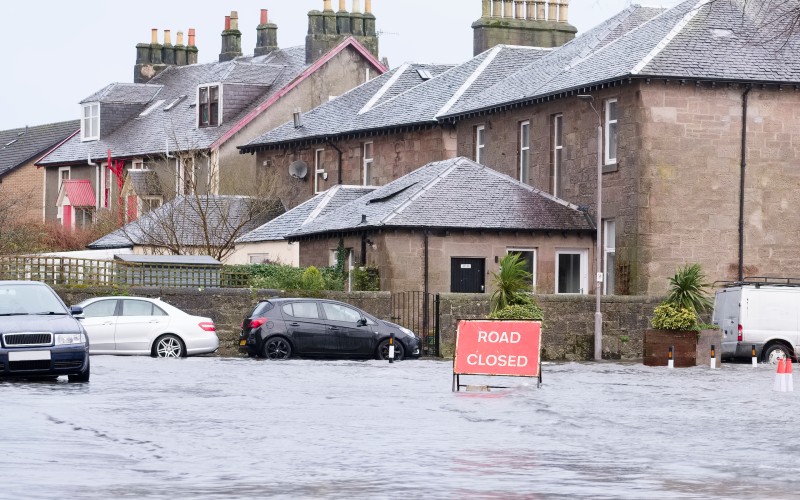
Last week, Scotland saw its first red warning for rain since Storm Desmond in 2015. Storm Babet threatened a danger to life, severe flooding, and significant disruption across the country. Hundreds of residents in Brechin were evacuated from their homes as the river South Esk breached the flood defence wall and caused extensive damage to hundreds of properties.
In the wake of Storm Babet, many may be left wondering – will my home insurance cover the cost of the damage, and how can I better prepare for any future storms? The good news is that most insurance policies will cover storm and flood damage, but exactly what is covered varies depending on the provider. Below are a series of suggestions to help safeguard your property and mitigate the risk of storm damage:
Preserve Your Property
One of the main reasons storm damage insurance claims are rejected is because the property has not been maintained to a reasonable standard. If your property has fallen into disrepair or there are longstanding maintenance issues, insurers may be reluctant to cover the cost of the damage. You should monitor the condition of your property and carry out regular maintenance checks and repairs. Most insurance policies will have a ‘wear and tear’ exclusion, which means damage caused naturally over some time will not be covered. This could include cement or mortar deterioration on brickwork and chimneys, loose or cracked tiles and aged flat roofs. For example, if you make a claim for storm damage because your roof tiles have blown off, but the insurer inspects the roof, and it turns out that the roof tiles were already damaged, they may refuse the claim. It is imperative that you maintain your property to a reasonable standard, as most insurance policies are there to protect against one-off unforeseen events – not ongoing maintenance or damage caused by neglecting the property.
Document the Position
It is important to keep a record of any maintenance or repairs that you have carried out to your home. Documentation can help demonstrate the condition of your property before the damage, which your insurance company may require as part of the claim assessment. You should contact your insurance company as soon as you can after the damage has occurred and, if you can, take photos and videos of the damage. Your insurance company may have a 24-hour claims line you can use. You should also try to keep anything that has been damaged as evidence, should they query it. Be sure to record the loss of personal items, as most insurance policies include personal property coverage up to a scheduled limit.
Check the Fine Print
It is prudent to understand the terms of your insurance policy and establish exactly what kind of damage your policy covers. For example, while some insurance policies cover outbuildings and sheds, others may not. Additionally, some insurers may define what is considered a ‘storm’ in the Terms and Conditions of their policy documents. Most home insurance policies cover flood damage, but you should check the level of coverage in your policy wording. Some properties are located in areas deemed a ‘high flood risk’ and may find it difficult to source affordable home insurance which covers flood damage. To combat this, the Flood Re scheme was introduced in 2016. Flood Re is a reinsurance company used to help providers offer more affordable home insurance policies. You can view the list of insurers currently using Flood Re in their policies via their website: https://www.floodre.co.uk/. You should review your insurance policy regularly and ensure you are covered for the full value of your property.
Know Your Boundaries
Boundary disputes are one of the most common disputes that arise, particularly following periods of bad weather, which may have caused damage to boundary fences and walls. Insurance policies are unlikely to cover damage caused by storm weather to fences, walls and hedges, leaving the repairs up to the owner. If the fence or wall is a boundary between two properties, there is often uncertainty as to who is responsible for the repairs, which may lead to a dispute. In cases of uncertainty, the title deeds to your property are generally a good place to start, as they may confirm who is responsible for the boundary. If it is unclear from the title deeds who is responsible for the boundary, you should ask your solicitor to check your title and confirm the position.
Common repairs, especially in tenement buildings, can also cause disputes, as there may be anomalies and inconsistences between the titles for each property within the tenement. If you live in a tenement, the Tenement (Scotland) Act 2004 will apply if your title deeds are not clear on the responsibility of common repairs. The 2004 Act regulates the rights and responsibilities of tenement property owners in the absence of title provision and provides a common scheme of management for dealing with repairs in tenements. Wherever possible, it is always encouraged to approach boundary and common repair disputes with caution to try and maintain an amicable relationship.
Batten Down the Hatches
If you know bad weather is on its way, you should take reasonable steps to secure your property and bring what you can indoors. Some policies exclude coverage for anything outdoors, such as garden furniture, and therefore, it is essential that you plan ahead and protect your belongings as best you can. Ensuring all furniture, play area equipment and toys are secure will also reduce the risk of loose items damaging any properties during periods of high wind speeds.
As we see an increase in the number of storms affecting Scotland, it is important to be prepared and secure your home as best you can. Taking proactive steps to safeguard your property can help minimise potential damage and ensure you are as protected as possible.
If you have any questions or require more information on our property services, please contact our property team on 03330 430150.

